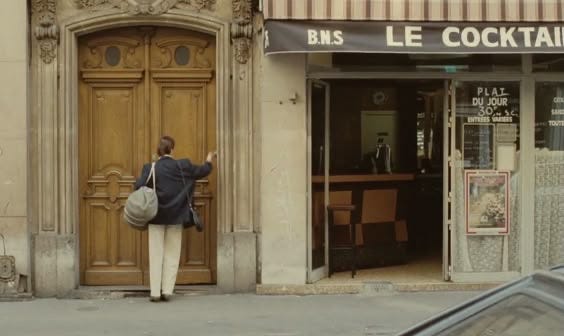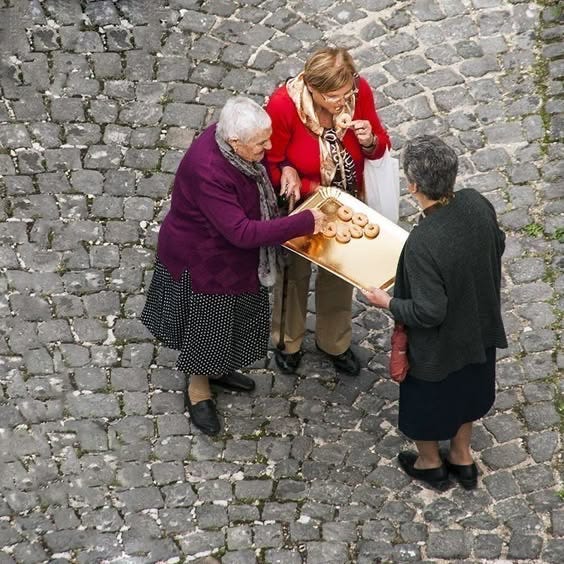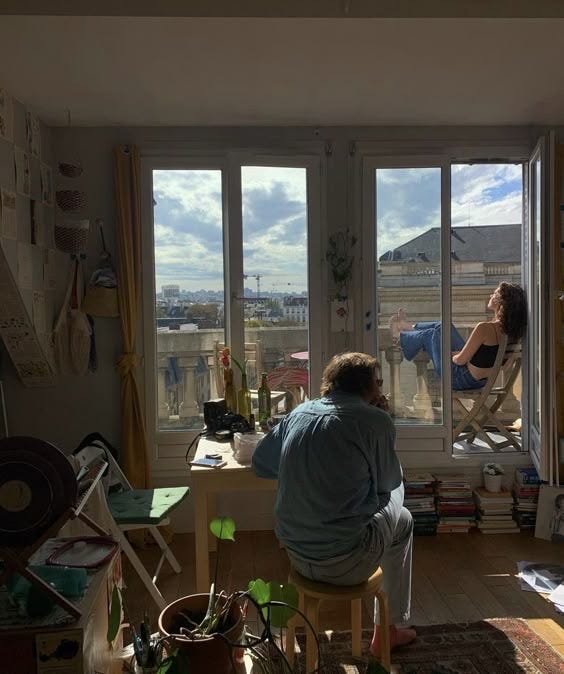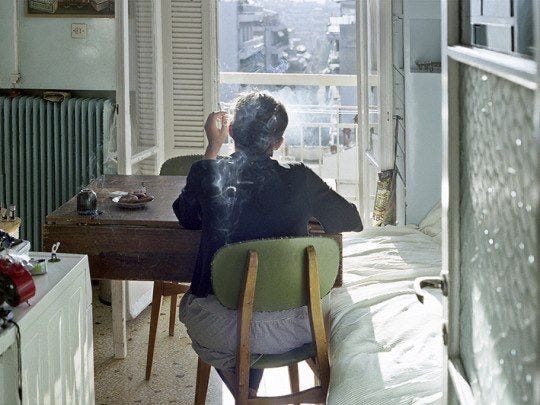there’s a peculiar ache that follows us in adulthood — a subtle suspicion that we are meant for more than what our lives currently look like. not in the grand, ambitious way of youth, but in the smaller, more private sense. the longing doesn’t shout; it hums under the surface. a subtle discontent that blooms while doing the dishes or refreshing your email or noticing that your coffee tastes exactly the same as it did yesterday. we don’t talk about it much, but we all feel it: the question of whether the days we are living — these slow, repetitive, practical days — are enough. whether we’re squandering our time by living so ordinarily.
for a long time, i mistook this feeling as a sign that something was missing. that i wasn’t working hard enough, manifesting intentionally enough, changing dramatically enough. i used to believe a meaningful life had to feel like a constant becoming — that unless i was changing, upgrading, becoming someone newer or better, i was wasting time. that belief made my ordinary days feel like placeholders. dead air. the uneventful space between real life.
but somewhere along the way, something shifted. maybe it was burnout. maybe it was therapy. maybe it was just growing up. but i stopped chasing transcendence and started paying attention and when i did, i realized something quietly profound: the ordinary wasn’t empty. it was full. it was the container that held everything real. the small gestures, the invisible choices, the days that looked like nothing from the outside but were slowly building a life i could actually live. i just hadn’t been present enough to notice it.
today i want to talk about that noticing, about learning to stay — not just in our relationships or careers or commitments, but in the mundane texture of our actual lives. because meaning, it turns out, doesn’t arrive in grand epiphanies or dramatic turning points. it gathers slowly in the spaces we learn to inhabit fully.
so here are some reflections — not rules, not prescriptions — on how i’ve started to find meaning in the parts of life that look the least important but end up mattering the most.
stay long enough for the ordinary to open up
our instinct is to rush through anything that doesn’t feel instantly meaningful. the second a moment feels slow, we distract ourselves. we pick up our phone, start planning the next thing, or tell ourselves the real day will begin once we’re being productive again. but some of the most quietly meaningful moments don’t announce themselves. they need your stillness. they require your attention. the way a room looks in the afternoon light. the feeling of your own body exhaling after a long stretch of tightness. the simple satisfaction of folding clothes or cutting fruit or walking the same route you always do, but slower this time. meaning doesn’t shout. it waits to be seen.
let your life be unremarkable — and still deeply yours
we’ve been conditioned to believe that a meaningful life must be remarkable. that it should be big, visible, admired. but the truth is, most people’s lives — even the happiest ones — are built on repetition. your morning coffee will taste the same most days. your commute will blur. your to-do list will refill itself. there is nothing glamorous about maintenance. but maintenance is where real love lives. it’s where devotion hides. in the cleaning, the tending, the returning. when you stop trying to make your life remarkable, you begin to see how deeply it already belongs to you. and that belonging — not performance, not productivity — is what makes it matter.
redefine aliveness
we often equate aliveness with adrenaline. the thrill of travel, the dopamine of a new purchase, the rush of romantic tension. but there’s another kind of aliveness — a subtler one — that we overlook. it’s the aliveness that comes from being in your life rather than outside of it. not observing it for others, not documenting it to prove its worth, but inhabiting it fully. breathing in sync with it. when you cook without multitasking. when you laugh mid-conversation and forget what you were so worried about. when you sit on the floor with a child and let their world become yours for a moment. these instances don’t generate stories. they generate memory. body memory. the kind that lingers.
use rituals to shape your time with care
not everything needs to be sacred. but something should be. our days slip away quickly when they’re undifferentiated — when there’s no punctuation, no softness, no edges. rituals give shape to time. they tell your body: this is when we return to ourselves. a cup of tea in silence before bed. washing your face slowly. playing the same song every sunday while you clean. it’s not about what the ritual is. it’s about marking the moment. when you treat your life as something worth marking, it starts to feel like something worth remembering.
don’t underestimate the power of being emotionally moved
i’ve learned to pause whenever i feel a lump in my throat. not out of discomfort, but out of reverence. that lump — that sudden rise of emotion — is often the soul’s way of saying: pay attention. it can be a sentence in a novel, a look exchanged across the room, a sudden memory that arrives without warning. these aren’t coincidences. they’re clues. i’ve built a more meaningful life by letting myself be changed by these tiny moments — by letting art, music, beauty, memory reach me instead of brushing them off in the name of efficiency. what moves you, reveals you.
write down things even when they seem too small to matter
we often wait for big insights to start writing. but some of my most precious entries are about almost nothing. the way the sky looked. a conversation that made me feel grounded. the exact words my son used when he said something funny. these are not lessons. they are records of aliveness. when you write things down, you’re not just preserving memory — you’re validating your life. you’re telling yourself that it was worth noticing. and when you do this regularly, your days stop blurring. they become textured, storied, yours.
allow for a kind of loneliness that is not a problem to be fixed
not all loneliness needs to be cured. some of it just needs to be sat with. ordinary days often bring a quiet kind of loneliness — not the painful, aching kind, but the subtle sense that no one else is quite in your moment with you. and instead of reaching for noise, or calling someone, or scrolling it away, i’ve learned to let it be. to sit with myself, not as someone to be escaped, but as someone to be companioned. that simple act — choosing your own presence — is one of the most meaningful things you can do.
keep something alive — even if it’s just a plant
care is a gateway to meaning. when you tend to something outside yourself — a plant, a pet, a sourdough starter, a piece of writing — you participate in a kind of quiet devotion that deepens your relationship to time. you watch something grow. you adjust, respond, nurture. it makes your days less about consumption and more about continuity. there’s a different texture to a life where you are responsible for something thriving — not in a pressured way, but in a loving one. it makes the day feel like it’s holding more than just you.
stop waiting for clarity to make your life feel worthwhile
we think meaning comes after we’ve figured it out. after the epiphany, the breakthrough, the rebrand. but most of life is lived in the middle. the unfigured-out part. the part where you’re not sure what you’re doing but you’re doing it anyway — showing up, cleaning your apartment, calling your friends back, learning to make soup. these things don’t feel like a story. but they are. you are in it. and one day, you’ll look back and realize: this was the part that made everything else possible.
that’s the real lesson: meaning doesn’t announce itself in grand gestures or dramatic moments. it settles in the steady rhythm of ordinary days, in the gentle insistence of showing up for yourself again and again, even when it feels small or invisible. it lives in the grace of patience, the courage to feel without rushing to fix, and the quiet celebration of just being—flawed, unfinished, and entirely human. when we stop chasing something “more,” when we allow the ordinary to be enough, we discover that our lives have always held the meaning we were looking for. it just took slowing down enough to see it.









Dear Milk and Cookies,
I just wanted to say how much I deeply enjoy your writing and the way you so gracefully shine a light on the simple things in life. Your words resonate with such clarity and quiet brilliance. I’m truly grateful for the way you help so many of us see the obvious—the kind that’s hardest to notice.
Thank you, truly.
With appreciation,
Adam
I feel this on a deep level. I always thought I was ‘special’, that I was going to have a different life to ordinary mortals, that I was going to achieve everything. Then life happens and not everything is like that. There's an emptiness and a sense of unfulfilled duty. But as you grow up, you realise that your life is already rich with the little things and that these are often worth more than having more money, a bigger house or finishing a new course.